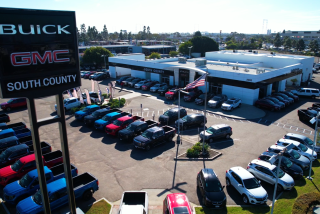Toyota speeds past Chrysler
- Share via
It’s official: The Big Three, as we know it, is no more.
Toyota Motor Corp. surged into the top three in U.S. auto sales for 2006. In doing so, it ousted perennial third-place finisher Chrysler Group and ended the year with a 12.5% annual sales gain.
Toyota’s advance -- a foregone conclusion after many months of finishing ahead of Chrysler Group -- brought a symbolic end to the domestic automakers’ traditional grouping as the Big Three. The Japanese company, riding high on the sales of fuel-efficient cars and smaller trucks, is on track to overtake Ford in U.S. sales this year.
“We exist in a global economy, and the American car companies just can’t lead forever,” said Alex Rosten, an analyst with Santa Monica-based Edmunds.com, an online automotive information provider. “The time for their North American dominance is over.”
Americans bought 16.6 million new vehicles during the year, with light trucks -- minivans, sport utility vehicles, crossovers and pickup trucks -- making up 53% of the market.
There were a few surprises, analysts said, the biggest perhaps that truck sales remained strong despite high fuel prices. That’s because the newest truck category, crossovers, is made up of SUV-styled vehicles built on passenger car platforms for reduced weight and improved handling and fuel economy.
The year also was marked by a surge in sales of small cars and a growing realization by U.S. automakers that the future lies in the development of alternative fuels and power plants to reduce the nation’s dependence on crude oil.
Detroit-based General Motors Corp., buoyed by a line of redesigned large SUVs and the stepped-up introduction of several car models, remained solidly in first place with sales of 4.03 million vehicles, 60% of them trucks. That was almost 400,000 fewer vehicles than GM sold in 2005, an 8.8% decline for the year.
A fading Ford Motor Co. ended 2006 in second place with sales of 2.72 million cars and light trucks, down 8% from a year earlier. Chrysler ended in fourth, with sales of 2.14 million vehicles, a 7% drop.
Both companies were hit by sagging sales of trucks. Ford sales analyst George Pipas attributed a 21% drop in December in sales of the company’s flagship F-150 pickup largely to customer wariness over a soft housing market.
GM, Ford and Chrysler Group, a unit of DaimlerChrysler of Germany, all have suffered from a surplus of large vehicles that don’t compete well in fuel economy with their Asian and European competition.
Other woes, including soaring healthcare and retiree benefit costs and expensive excess plant capacity, have prompted all three to reexamine their game plans.
GM and Ford have announced major reductions of their U.S. workforces and facilities as they strive to slash billions of dollars from their annual operating costs. Chrysler Group is undergoing an internal review that is expected to result in a significant restructuring to be announced early this year.
Meantime, Toyota is on track to become the world’s largest automaker by the end of the decade, replacing longtime leader GM atop the heap as it skillfully manipulates its product lineups to match the needs of the regions in which it operates.
The Japanese giant’s strong U.S. showing for 2006 was fueled by its predominance in the gasoline-electric hybrid market, its strong lineup of fuel-efficient cars and SUVs and an increasingly competitive stable of larger trucks.
The U.S. companies saw their combined sales drop 8.1% for the year and their share of the U.S. passenger vehicle market fall to 53.7% from 56.9% in 2005.
Asian imports collectively gained almost 3 points of market share to end the year at 39.4% and saw annual sales rise by 5.1%.
Honda Motor Co., which boasts the most fuel-efficient lineup in the U.S., posted its best year ever, with 1.51 million cars and trucks sold for an annual gain of 3.2% and a fifth-place finish.
Nissan Motor Co. rounded out the top six with sales of 1.08 million vehicles -- a 5.3% decline brought about largely by declines in sales of its largest pickups and SUVs and a car lineup that stressed power and performance over fuel economy.
Underscoring the importance that fuel-efficiency played in the market in 2006, Suzuki Motor Corp. of Japan posted a 23% sales gain for the year. The maker of small, fuel-efficient cars and SUVs outstripped all rivals in percentage sales gain.
Another big increase was posted by South Korean automaker Kia Motors Corp., which also specializes in smaller vehicles. Propelled by strong demand for its Optima mid-size and Spectra compact cars and Sportage small SUV, Kia sales soared 66% in December. The company reported an annual sales gain of 6.7%, sixth among the 23 mainstream car companies whose monthly sales are tracked by Autodata Corp.
Analysts believe that customers will continue to shop for fuel-efficient smaller cars and SUVs this year, although not in big enough numbers to break the vehicles out of their niche status.
“Unless fuel prices hit $4 a gallon, Americans still want bigger vehicles for the most part,” said George Magliano, New York-based analyst for Global Insight.
He and other industry experts believe that five- to nine-passenger mid-size and large crossovers will be the most popular market segment this year, especially now that GM and Ford have dropped conventional minivans from their lineups.
*
(BEGIN TEXT OF INFOBOX)
Total 2006 sales
*--* Sales % change (millions from Market of vehicles) 2005 share GM 4.03 --8.8% 24.3% Ford 2.72 --8.0% 16.4% Toyota 2.54 +12.5% 15.4% Chrysler 2.14 --7.0% 12.9% Honda 1.51 +3.2% 9.1% Nissan 1.02 --5.3% 6.2% Hyundai 0.46 +0.1% 2.8% Kia 0.29 +6.7% 1.8% BMW 0.27 +3.1% 1.7% Mazda 0.27 +4.0% 1.6%
*--*
Source: Autodata






